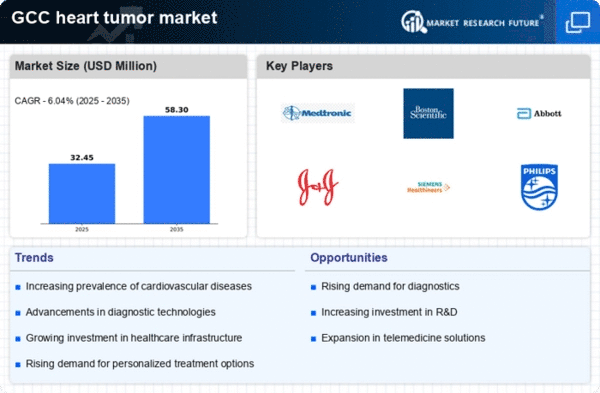Rising Incidence of Heart Tumors
The heart tumor market is experiencing growth due to the increasing incidence of heart tumors in the GCC region. Recent data indicates that the prevalence of cardiac tumors is on the rise, with estimates suggesting that around 1 in 2,000 individuals may be affected. This growing patient population necessitates enhanced diagnostic and treatment options, thereby driving demand within the heart tumor market. Furthermore, the aging population in the GCC, coupled with lifestyle factors such as obesity and sedentary behavior, contributes to this upward trend. As healthcare providers become more aware of the need for specialized care in this area, the heart tumor market is likely to expand, leading to increased investments in research and development of innovative therapies.
Government Initiatives and Funding
Government initiatives aimed at improving healthcare infrastructure are playing a pivotal role in the heart tumor market. In the GCC, various governments are allocating substantial funds to enhance cancer care services, including those for heart tumors. For example, recent budgets have earmarked millions of dollars for cancer research and treatment facilities. This financial support is likely to foster innovation and improve access to advanced therapies for patients. As a result, the heart tumor market is expected to benefit from increased research funding, leading to the development of new treatment options and improved patient care pathways.
Advancements in Treatment Modalities
Innovations in treatment modalities are significantly impacting the heart tumor market. The introduction of minimally invasive surgical techniques and targeted therapies has revolutionized the management of cardiac tumors. For instance, the use of robotic-assisted surgery has shown to reduce recovery times and improve patient outcomes. Additionally, the development of novel pharmacological agents tailored for specific tumor types is gaining traction. According to recent estimates, the market for targeted therapies in oncology is projected to reach $100 billion by 2026, indicating a substantial opportunity for growth in the heart tumor market. These advancements not only enhance treatment efficacy but also attract investment from pharmaceutical companies, further propelling the market forward.
Increased Awareness and Screening Programs
The heart tumor market is benefiting from heightened awareness and the implementation of screening programs across the GCC. Public health initiatives aimed at educating the population about the signs and symptoms of heart tumors are crucial. As awareness increases, more individuals are likely to seek medical attention, leading to earlier diagnosis and treatment. Recent campaigns have reported a 30% increase in screening rates for cardiac conditions, which includes heart tumors. This proactive approach not only improves patient outcomes but also stimulates growth in the heart tumor market as healthcare providers expand their services to accommodate the rising demand for diagnostic and therapeutic interventions.
Collaboration Between Healthcare Stakeholders
Collaboration among healthcare stakeholders is emerging as a key driver in the heart tumor market. Partnerships between hospitals, research institutions, and pharmaceutical companies are fostering innovation and improving treatment outcomes. These collaborations often lead to clinical trials that explore new therapies and diagnostic tools, which are essential for advancing the heart tumor market. In the GCC, several initiatives have been launched to promote such partnerships, resulting in a more integrated approach to patient care. This synergy not only enhances the quality of treatment but also accelerates the development of new solutions, thereby expanding the heart tumor market.
















